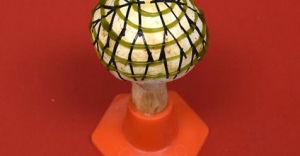What Is The 'Mushroom Of Immortality'?
Nicknamed the "mushroom of immortality" in English, Ganoderma mushrooms are known as "reishi" in Japanese and as "lingzhi" in Chinese. Ganoderma is a group of fungi that break down wood or cause white rot on certain tree species in the environment. Humans use Ganoderma fungi to treat anything from the flu to cancer. Some consume it as a preventative anti-inflammatory treatment. It's even marketed as a superfood. Reishi/lingzhi has been referenced as far back as 100 B.C. as a supplement used to improve human health.
Studies have found promising immune-boosting effects of the mushroom of immortality, particularly for those who are ill and less so for those that are healthy. Unsurprisingly, the reishi/lingzhi trade industry has a global market of more than $2.16 billion or approximately 2% of the worldwide dietary supplement sales. Recently, scientists tested 20 manufactured products of Ganoderma, including pills, tablets, teas and other consumables as well as 17 grow-your-own kits that were labeled as containing the species Ganoderma lucidum.
Author: Linh Anh Cat
Read the full articel here
Researchers say creation of 'bio-hybrids' from fungi and bacteria could be used to power devices
A regular shop-bought mushroom has been turned into an electricity generator in a process scientists hope will one day be used to power devices.
The “bionic mushroom” was covered with bacteria capable of producing electricity and strands of graphene that collected the current.
Shining a light on the structure activated the bacteria’s ability to photosynthesise, and as the cells harvested this glow they generated a small amount of electricity known as a “photocurrent”.
The fungi supported this process by providing the bacteria with viable surface on which to grow as well as nutrients to stay alive.
» Check out the video and also read more
Source: Independent - Josh Gabbatiss, Science Correspondent @josh_gabbatiss






















